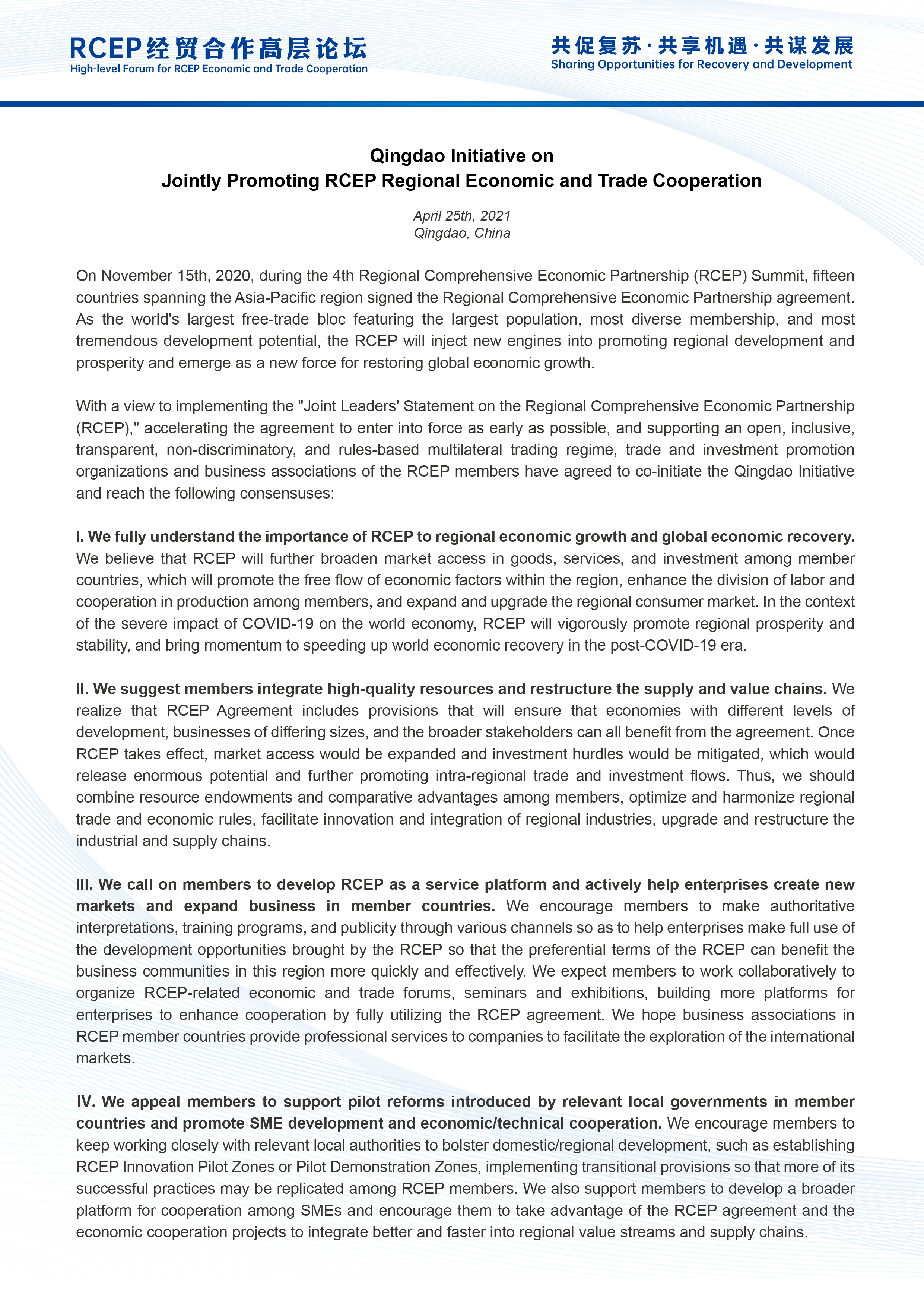Qingdao Initiative on
Jointly Promoting RCEP Regional Economic and Trade Cooperation
April 25th, 2021
Qingdao, China
On November 15th, 2020, during the 4th Regional Comprehensive Economic Partnership (RCEP) Summit, fifteen countries spanning the Asia-Pacific region signed the Regional Comprehensive Economic Partnership agreement. As the world's largest free-trade bloc featuring the largest population, most diverse membership, and most tremendous development potential, the RCEP will inject new engines into promoting regional development and prosperity and emerge as a new force for restoring global economic growth.
With a view to implementing the "Joint Leaders' Statement on the Regional Comprehensive Economic Partnership (RCEP)," accelerating the agreement to enter into force as early as possible, and supporting an open, inclusive, transparent, non-discriminatory, and rules-based multilateral trading regime, trade and investment promotion organizations and business associations of the RCEP members have agreed to co-initiate the Qingdao Initiative and reach the following consensuses:
I. We fully understand the importance of RCEP to regional economic growth and global economic recovery. We believe that RCEP will further broaden market access in goods, services, and investment among member countries, which will promote the free flow of economic factors within the region, enhance the division of labor and cooperation in production among members, and expand and upgrade the regional consumer market. In the context of the severe impact of COVID-19 on the world economy, RCEP will vigorously promote regional prosperity and stability, and bring momentum to speeding up world economic recovery in the post-COVID-19 era.
II. We suggest members integrate high-quality resources and restructure the supply and value chains. We realize that RCEP Agreement includes provisions that will ensure that economies with different levels of development, businesses of differing sizes, and the broader stakeholders can all benefit from the agreement. Once RCEP takes effect, market access would be expanded and investment hurdles would be mitigated, which would release enormous potential and further promoting intra-regional trade and investment flows. Thus, we should combine resource endowments and comparative advantages among members, optimize and harmonize regional trade and economic rules, facilitate innovation and integration of regional industries, upgrade and restructure the industrial and supply chains.
III. We call on members to develop RCEP as a service platform and actively help enterprises create new markets and expand business in member countries. We encourage members to make authoritative interpretations, training programs, and publicity through various channels so as to help enterprises make full use of the development opportunities brought by the RCEP so that the preferential terms of the RCEP can benefit the business communities in this region more quickly and effectively. We expect members to work collaboratively to organize RCEP-related economic and trade forums, seminars and exhibitions, building more platforms for enterprises to enhance cooperation by fully utilizing the RCEP agreement. We hope business associations in RCEP member countries provide professional services to companies to facilitate the exploration of the international markets.
Ⅳ. We appeal members to support pilot reforms introduced by relevant local governments in member countries and promote SME development and economic/technical cooperation. We encourage members to keep working closely with relevant local authorities to bolster domestic/regional development, such as establishing RCEP Innovation Pilot Zones or Pilot Demonstration Zones, implementing transitional provisions so that more of its successful practices may be replicated among RCEP members. We also support members to develop a broader platform for cooperation among SMEs and encourage them to take advantage of the RCEP agreement and the economic cooperation projects to integrate better and faster into regional value streams and supply chains.

